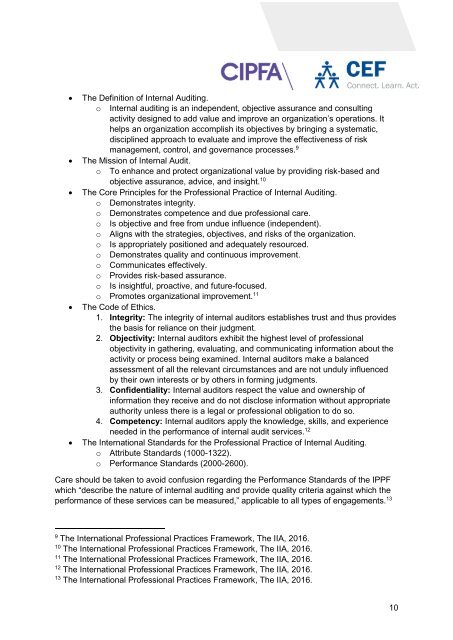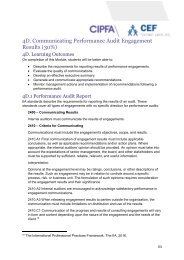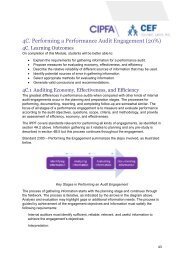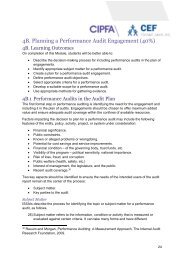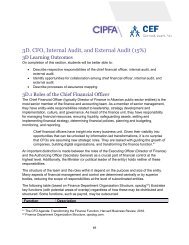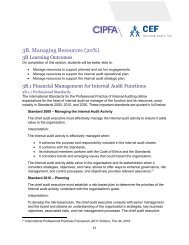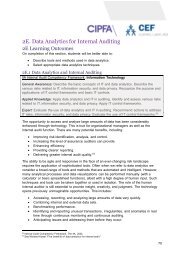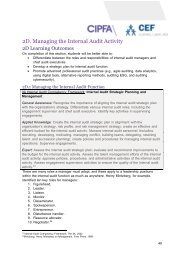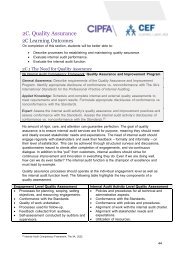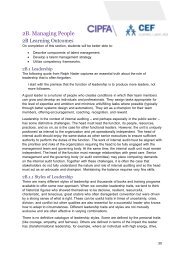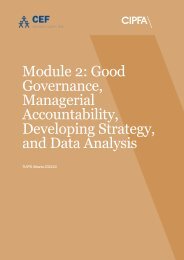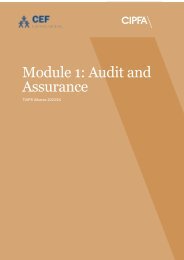Create successful ePaper yourself
Turn your PDF publications into a flip-book with our unique Google optimized e-Paper software.
The Definition of Internal <strong>Audit</strong>ing.<br />
o Internal auditing is an independent, objective assurance and consulting<br />
activity designed <strong>to</strong> add value and improve an organization’s operations. It<br />
helps an organization accomplish its objectives by bringing a systematic,<br />
disciplined approach <strong>to</strong> evaluate and improve the effectiveness of risk<br />
management, control, and governance processes. 9<br />
The Mission of Internal <strong>Audit</strong>.<br />
o To enhance and protect organizational value by providing risk-based and<br />
objective assurance, advice, and insight. 10<br />
The Core Principles for the Professional Practice of Internal <strong>Audit</strong>ing.<br />
o Demonstrates integrity.<br />
o Demonstrates competence and due professional care.<br />
o Is objective and free from undue influence (independent).<br />
o Aligns with the strategies, objectives, and risks of the organization.<br />
o Is appropriately positioned and adequately resourced.<br />
o Demonstrates quality and continuous improvement.<br />
o Communicates effectively.<br />
o Provides risk-based assurance.<br />
o Is insightful, proactive, and future-focused.<br />
o Promotes organizational improvement. 11<br />
The Code of Ethics.<br />
1. Integrity: The integrity of internal audi<strong>to</strong>rs establishes trust and thus provides<br />
the basis for reliance on their judgment.<br />
2. Objectivity: Internal audi<strong>to</strong>rs exhibit the highest level of professional<br />
objectivity in gathering, evaluating, and communicating information about the<br />
activity or process being examined. Internal audi<strong>to</strong>rs make a balanced<br />
assessment of all the relevant circumstances and are not unduly influenced<br />
by their own interests or by others in forming judgments.<br />
3. Confidentiality: Internal audi<strong>to</strong>rs respect the value and ownership of<br />
information they receive and do not disclose information without appropriate<br />
authority unless there is a legal or professional obligation <strong>to</strong> do so.<br />
4. Competency: Internal audi<strong>to</strong>rs apply the knowledge, skills, and experience<br />
needed in the performance of internal audit services. 12<br />
The International Standards for the Professional Practice of Internal <strong>Audit</strong>ing.<br />
o Attribute Standards (1000-1322).<br />
o <strong>Performance</strong> Standards (2000-2600).<br />
Care should be taken <strong>to</strong> avoid confusion regarding the <strong>Performance</strong> Standards of the IPPF<br />
which “describe the nature of internal auditing and provide quality criteria against which the<br />
performance of these services can be measured,” applicable <strong>to</strong> all types of engagements. 13<br />
9<br />
The International Professional Practices Framework, The IIA, 2016.<br />
10<br />
The International Professional Practices Framework, The IIA, 2016.<br />
11<br />
The International Professional Practices Framework, The IIA, 2016.<br />
12<br />
The International Professional Practices Framework, The IIA, 2016.<br />
13<br />
The International Professional Practices Framework, The IIA, 2016.<br />
10


